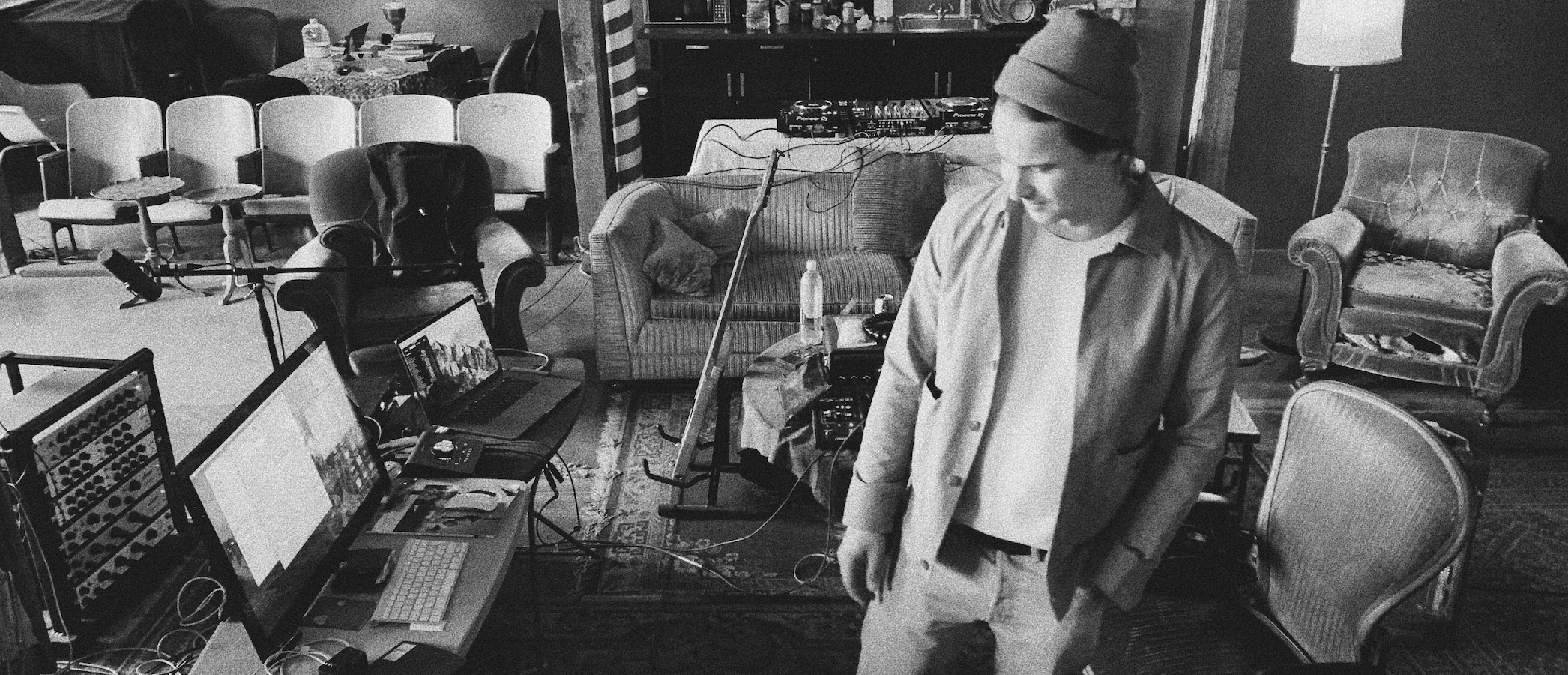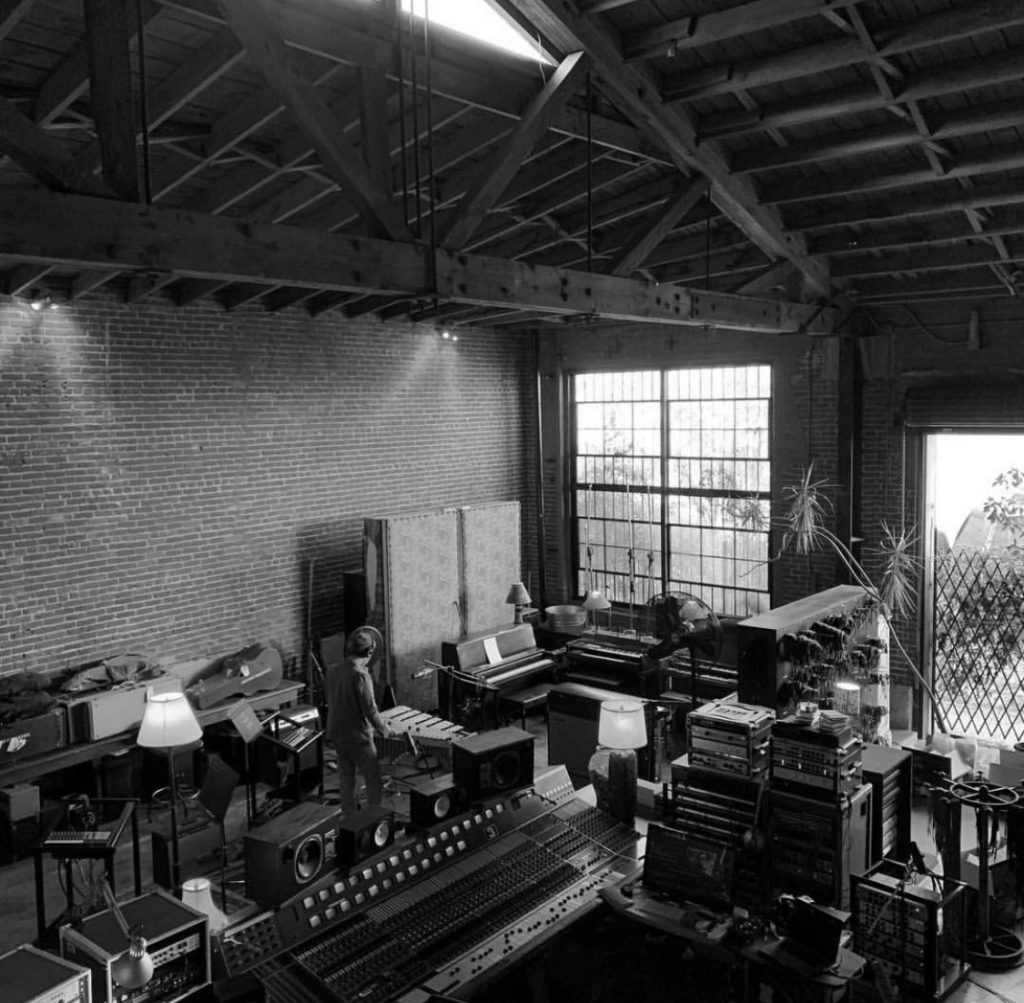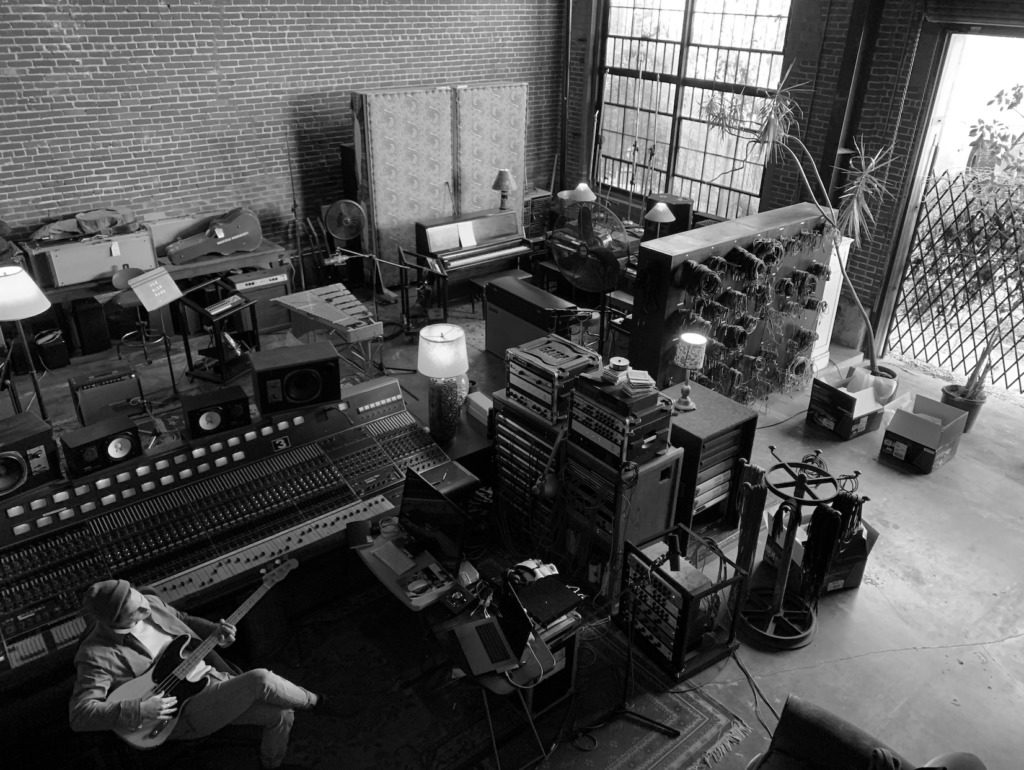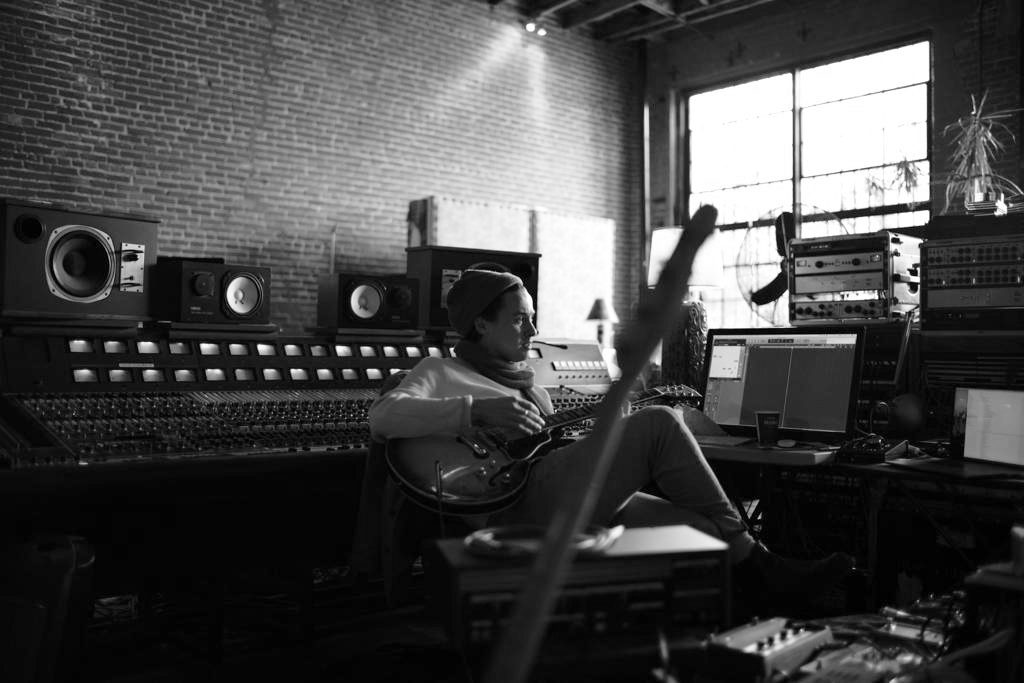Artist Tips: Jungle
Josh Lloyd-Watson talks production.

Artist Tips: Jungle
Josh Lloyd-Watson talks production.
In Josh Lloyd-Watson’s Down Town Los Angeles recording studio, you’ll find a framed piece of paper on one of the back walls. Amongst the synthesisers, guitars, and other bits of musical equipment, it feels rather insignificant but it’s actually one of the cornerstones of his Jungle project, launched in 2013 alongside Tom McFarland and now signed to XL Recordings.
At the top of the page it reads “10 Rules of Production,” and what follows is a list of tips, tricks, and reminders that has formed the basis for all the duo’s work. “We actually wrote them before we released anything, and then we framed it,” Lloyd-Watson explains. “We’ve been in bands for more than a decade and we’ve made a lot of mistakes, and most people don’t see that. When someone does well, you don’t often see the work that’s gone into it; it’s like an iceberg where there’s a lot beneath the surface. God help me if some of my early work came out!”
Few could deny that that touchpoints have worked. The best-friends, known respectively as “J” and “T”, have released two albums, the first of which, a mesmeric, future-facing, modern soul record, was nominated for the Mercury Music Prize and sold 100,000 copies in the UK alone, and over five times that globally. They returned last year with For Ever, written in the Hollywood Hills and featuring stand-out tracks like “Casio,” “Happy Man” and “Heavy California,” cementing their status as one of contemporary electronic music’s most singular production duos.
More music is on the way, but first they offered to share some of the tips behind their work. What follows is a compressed version of a selection of these rules, and an explanation by Lloyd-Watson of what they mean and how they apply them in practice.
Simplicity is Genius
The tiniest building blocks add up to make something much bigger. If you complicate the structures and the structures of what each part is doing too much at an early stage, it tends to be a fucking mess later on. In contrast, if you build simple building blocks and stack the layers with simplicity then that’s when you end of with something really good.
The best songs are the stupidly simple ones. Melodies are constantly repeating in popular music; we all have tendencies to lean towards things that sound familiar. It’s actually the performer that brings the character, emotion, and narrative.
I think we kept things simple on the first album, more out of instinct, but there have certainly been pieces of music we’ve released that have been a little bit too complicated for my liking. At the same time, we’ve released songs like “Casio,” which is stupidly simple!
On a simple piece of music, your ego will always be like It’s not justifying my sense of art, but you have to overcome that. I’ve been painting recently and it’s all about self-expression instead of Look how good I am that I’ve done this. It’s purely just that’s how I felt rather than any attempt to prove something to myself, and I try to just express myself like that with music. The ego is dangerous; a lot of the best art, painting or music, comes when you don’t give a fuck and you just slap a bit of paint on it!
It can help to remind yourself that whatever you’re working in is not going to be the last song that you’re going to write. If you can remember that then you can get rid of these dangerous preconceptions that what you’re writing needs to be the best song ever. Because if you sit down and try to make the best piece of art ever then you’re going to drive yourself mad in the process! Don’t be too precious!
Don’t Think About Making Art
What I’ve been doing a lot recently is just doing. Don’t think about art; instead, just get it done. If you think about art and you think too much about making art then you’re not actually going to make art, and as soon as you bring thinking into the process then you go into this different mode. You become an analytical guy who is cynical and egotistical, and this really hinders the creative process. So don’t think about it!
I think it’s about getting things into a very short period of time. Your ego wants to you to spend a long time on it because it wants it to be perfect, but all the best things happen in about two minutes, then the rest of the time is spent thinking about it. The best tracks we’ve done have happened in the time it takes to listen to them, or at least the core idea. You might sit there for six months changing little bits that nobody is ever really going to notice but the actual sketch happens extremely quickly.
To do this, I do something that I believe Brian Eno does actually. Paul Epworth told me that Brian Eno always cleans the studio, like just putting batteries away and tidying the leads. That’ll be from 11 to 12, and then from 12 to 2 I’ll do a song. It doesn’t matter what that song is, but I am always writing something.
Owen Dylan Morris, who produced Oasis, also said that Noel Gallagher never stopped writing. I’ve been through a period where I’ve stopped writing and it’s almost impossible to start again. It’s like going to the gym in that way. Try doing a little song in an hour, and try not to think for that hour. You have to set a time limit because otherwise you’ll never finish. When creativity comes, there will be loads of options and this can mean that you start loads of projects and never finish anything. Some of the best albums are made in a week with the simplest setups.
You have to turn up, and there’s something comforting in that, but it’s not really working. The work actually comes when you begin playing music. Again, I compare it to when I go to paint: painting is not attached to money and success, and nobody is going to see it, so I don’t think about what I am trying to do or who I am trying to be, questions that will never have answers. If I want to slap a blue line there and another one there, I’ll do it because it’s my instinct. I try to be the same with music. Just do!
So, yeh, with any process in life, stop thinking about it just start doing; the thinking process can come before the art and after the art, but not during! So many people don’t make the thing they want to make because they think about it too much. They don’t begin painting because they spend all weekend thinking Maybe I should go to the art shop this weekend.
My ego was definitely more involved when I was younger, between 18 and 28. When you get to 28 or 29, you realise you don’t give a fuck about what other people think, and then the doors you can open up in your life are incredible. I was so scared to do stuff when I was younger, but now we are in a position that we can do what we want and it comes down to instinct and trusting that, and so we have to try not to analyse of overthink too much. I think it comes down to awareness, and being aware of the creative process. Take control.

Don’t Worry About Failure
Failure is everybody’s fear, and it’s a fear that is only in our own brains because it hasn’t happened yet.
I’ve just moved into this new studio and I have somebody next door and I’m always worried about disturbing them. I think that stopping from doing something based on something that hasn’t happened yet is insanity, but we’re all infected with it, probably because of some strange DNA trait. We run these crazy scenarios in our minds to stop us from dying or being attacked, but when you apply this on a creative level where there are no dangers then it can hinder expression.
You can’t do anything in particular to stop this but you have to be aware of it, to stop thinking what if people don’t like it. There are always going to be people who don’t like what you do. That’s why I don’t read YouTube comments, because there will always be bad ones and you always want to find them and you’ll always focus on them. Part of you wants to see them, to please the ego in a weird way, and this only feeds this fear of failure.
The more I’ve gotten on with it, I’ve realised that some people don’t like Jungle and some people love Jungle, which is cool. It’s good to have a dialog. Some people hate Kanye [West] and some people love Kanye, and that’s why we’re always talking about him. The biggest mistake is trying to please everyone because then you don’t get talked about at all. It’s better to be something rather than nothing.
Failure is a funny one because you just have to be aware of your thought processes and listen to your mind. Stop it in its tracks. Don’t project forward with fear, and recognise when you do and stop it.


Zag
Zag is the opposite to Zig. If everyone is zigging then you’ve got to zag somehow. It’s important to go against the grain. If everyone is using trappy hi-hats then I cannot use them, even if I like them. I will make conscious decisions about Jungle based on what everyone else is doing.
This might be just the way I work; some people want to just sell songs and sound like Taylor Swift, and that’s perfectly cool if you’re in it for the money, but I think there’s an artistic need in me to do something different. I want to do things in a way that hasn’t been heard, even though we’re always going to reference things.
We’ve got an industry where 10 percent of the artists at the top of it are killing it at the top of the charts with quite good songs, and then 60 percent are on major labels trying to do that, and then you have 20 percent doing really cool stuff at the bottom of the charts, like Floating Points and Nicolas Jaar. It’s not about numbers, it’s about a feeling and an emotion; it feels good because they are not trying to do what everyone else is doing. That’s a good place to be.
Jungle is a funny one because we started in a place where I didn’t know many of these things that I feel now. Like “Busy Earnin’” is a song from when I was 23, and it put us in a place. Some people liked it. It was like this bedroom psychedelia, and that’s where the benchpost went in. We became a brand, and you always have to think about that because you have to make money as an artist.
It’s now become harder for us to evolve because fans want more of what they like. That’s why they come back to us. It’s like, Five Guys does burger and chips so you go there for that. If they did the best mushroom soup, then even if it’s the best soup in the world then you won’t go there because you don’t want it from Five Guys. You go somewhere else for your soup.
Most artists can write multiple genres, and we’re the same. We’ve made albums of electronic and albums of classical music but we’ve not released it because we’re not sure it would work, and we’d disappoint a lot of people because they want to hear the same thing again, like me with Tame Impala. Artists have a style across their career and that’s ultimately why you go to them, and if you keep changing it then you lose your identity.
Maz
This is an interesting one! Maz is a plugin. It’s the Tony Maserati plugin. He was a mixing engineer but Waves did a plug-in signature series with him. We started using the plugin on the early songs to get a certain bass sound, like on “Platoon.” It became a thing for us on the first record, and it now symbolises the modulation of frequency, which we feel is really important. If you have a repeating sonic, It’s about how modulation can trick your brain into thinking the sonics are developing without actually changing the part or the arrangement of the part. You can chorus something and it modulates and develops by itself to whatever frequency you set it to.
In our music, we want everything to be a little wobbly. We want it to be a little uneasy. You think all this psychedelic stuff like Tame Impala sounds clean but it’s actually drenched in phase. So we use Maz to make a lot of the sounds more interesting, essentially “put a Maz on it.” Nowadays, it’s more a development thing, and we have to find new ways other than the Maz. I think it adds this special feeling to a record that makes Jungle sound like Jungle.
Earlier this month, Jungle released Back to Mine, a 19-track mix that delves through their personal collection of left-field-pop, deep house, modern jazz, Afro-funk, and symphonic soul.

